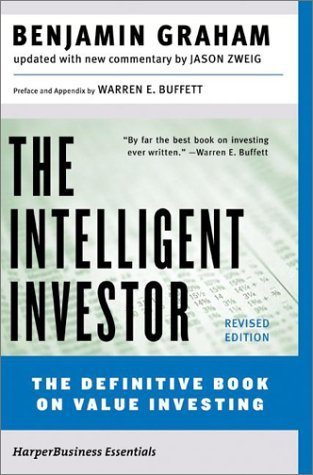Average Reading Time: 6 minutes (or a about the time the average man lasts in bed)
In the year 1950, an investor named Benjamin Graham published a book called, “The Intelligent Investor.” Though Graham is likely little known in today’s world, his understudy will ring familiar.
The reason you are likely to know Graham’s student is simply this: he is one of the most successful investors and one of the richest men in the history of the world.
His name: Warren Buffett.
Buffett credits much of his wisdom and billion-dollar success in the field of investing to Graham’s book and teachings. The first time Buffett ever read it, he says, he thought it was the best book ever written on investing. And, now, even 60 years later, even following the 80s crash, the 90s tech bubble and the 2000s mortgage crisis – guess what? He still does.
Buffett:
“I read the first edition of this book early in 1950, when I was nineteen. I thought then that it was by far
the best book about investing ever written. I still think it is.”
This is perhaps not so surprising when we consider the intended perseverance of Graham’s principles:
“The underlying principles of sound investment should not alter from decade to decade, but the application of these principles must be adapted to significant changes in the financial mechanisms and climate.”
This Intelligent Eater section is, of course, inspired by Graham and his methods. The purpose is to explore the similarly confusing but important field of nutrition by way of teasing out time-tested principles, truths and untruths (mostly by way of expert consensus), in order to lay out the actions, habits and beliefs of the “Intelligent Eater.”
[Here is my first Intelligent Eater post]You might find the parallels striking, as I do.
To understand these “methods,” let’s quickly take a look at what Graham meant by an “Intelligent Investor.”
Who is an Intelligent Investor and What Does he do?
In the foreword to the forth edition of the Intelligent Investor, Buffett describes the book as follows:
“To invest successfully over a lifetime does not require a stratospheric IQ, unusual business insights, or inside information. What’s needed is a sound intellectual framework for making decisions and the ability to keep emotions from corroding that framework.”
That is, the crux of Graham’s approach does not deal solely, or perhaps even primarily, with the minutiae of investing logistics or mechanics. It creates a framework that informs flawed human decision-making and, more importantly, provides defenses against those pesky feelings.
The Intelligent Investor basically answers three questions:
- How should I invest?
- What is a good framework through which to execute this plan?
- How do I limit negative side effects of my emotions and feelings, and maximize the positive effects?
Graham answers the first question of “how to invest,” via two major guiding principles – the first massively more important that the second:
- Guiding Principle #1: “Our main objective will be to guide the reader against the areas of possible substantial error.” That is, the main objective is to minimize ways to you hurt yourself. As Buffett quips about the rules of investing: “Rule no.1: don’t lose money. Rule no.2: never forget rule number 1.”
- Guiding Principle #2: The second, as Wall Street Journal columnist, Jason Zweig, nicely summarizes in the commentary of the fourth edition, is: “how you can maximize the chances of achieving sustainable gains”
So, limiting error and maximizing sustainable gains. Graham prescribes his book to “one interested chiefly in safety (principle #1) plus freedom from bother (i.e. Sustainable returns without 10 hours a day watching the stock ticker).”
And then there is the word “Intelligent.” Is Graham teaching how to increase your IQ? No. As Jason Zweig puts it, he is much more interested in character and continence than intellect:
“Graham defines the term—and he makes it clear that this kind of intelligence has nothing to do with IQ or SAT scores. It simply means being patient, disciplined, and eager to learn; you must also be able to harness your emotions and think for yourself. This kind of intelligence, explains Graham, ‘is a trait more of the character than of the brain.’”
And even this might be misleading. Because what Graham really means by “character,” I think, is “awareness.” Awareness of yourself, your shortcomings related to decision-making, your emotions, your tolerance to risk, your willingness to invest time, and your ability to apply the framework he lays out.
Graham stamps this warning in the introduction:
“We shall say quite a bit about the psychology of investors. For indeed, the investor’s chief problem—and even his worst enemy—is likely to be himself.”
Intelligent Investor to Intelligent Eater
Anyone else I had ever asked about investing would start off spouting things off about indexes, options, diversification, leverage, or some such other term I vaguely grasped. None of them started off the conversation saying: “look here you emotional wreck, here’s what you need to focus on – you need to temper that humanly-flawed decision-making processes and, most of all, those bedeviled things you call feelings!”
In fact, had they said this to me outright, I’d have pinned them as some sorta liberal kook. But most books and authors aren’t like this book or this author.
Most people aren’t worshipped by one of the most successful, self-made and sustained investors of all-time. Most books are not called the “best investing book ever written.” And most books do not fundamentally change other aspects of your behavior and overall approach to life.
One of those fundamental changes was infused into how I approach what to eat everyday. That is, what to eat in order to achieve maximum health and performance for the longest possible life span (what researchers call my “healthspan”).
I think that these concepts translate quite nicely into forming a framework for how to approach what we should eat like an “intelligent” – as Graham defines it – eater. In doing so, I will attempt to answer three questions for the reader (you) and myself (me) (you may recognize these).
1) What should we eat in order to:
- Minimize the risk of negative health outcomes (disease, sickness, depression), and
- Maximize sustainable, positive health outcomes (healthspan)
2) How do we get ourselves to eat, say, kale instead of pizza everyday for lunch (habit and behavioral economics); and
3) What to do about emotions? Specifically – are they friend or foe — or both.
Right now you might be thinking, “wait a second, wise guy, what are ya, some kinda nutrition expert?! Why should we listen to you?!”
If that thought occurred to you, I have two things to say:
- Your inner monologue probably could use an update from a mixture of Moe and 1945 Film Noir, and
- No, I am not an expert.
What I am going to do is leverage the experts from all camps – vegan, paleo, low-carb, slow-carb, researchers in labs, medical journals – in order to distill the information with a simple framework that I have developed.
The framework I have developed over the course of about 15 years of self-experimentation, research, and speaking with some of the top experts in food nutrition, psychology and behavioral economics.
That something you might be interested in?
If so… come on in.. snooop around. [Click here for my first post on the topic]




3 Comments on “Becoming An Intelligent Eater: An Introduction”
what do you think about a “cheat day” and do you think that relates to investing?
I will get to cheat days for sure.
And yes, I think they actually do relate to investing. Sorta like taking 10% of your investing money and gambling with it.
The element of “maximizing sustainable gain” is interesting for both investing and nutrition…are there instances where short-term gains can be the goal and output of a good diet, like short-term memory, better sleep, better physique, etc.? Is there a difference in approach if the principle is to maximize short-term gains instead of long-term, or do those basically entail the exact same diets?